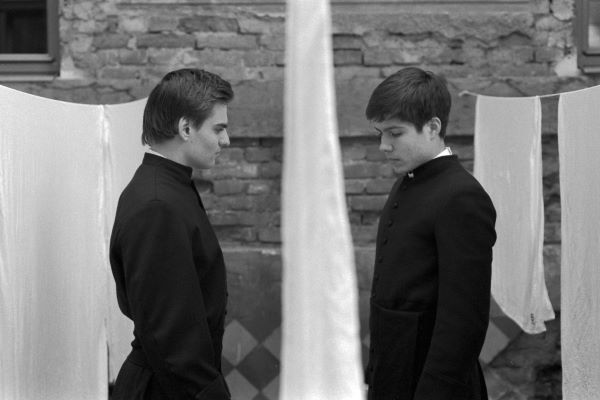![]() Almost as soon as Servants begins, we enter an insular, separate world. The soundscape is replete with dissonant violins and choral voices, and the images are in black and white. People are often very still, their faces almost expressionless, though often we sense they are either frightened to speak or holding tight some burning emotion, or secret.
Almost as soon as Servants begins, we enter an insular, separate world. The soundscape is replete with dissonant violins and choral voices, and the images are in black and white. People are often very still, their faces almost expressionless, though often we sense they are either frightened to speak or holding tight some burning emotion, or secret.
This is, in fact, Czechoslovakia in the early 1980s under totalitarian communist rule and set largely in a Roman Catholic seminary. An authoritarian regime might be a familiar setting for a film, as might the strait-laced world of the priesthood, yet the context here is much more specific. The Czech secret police target priests who are unwilling to fall in step with the government demands, and an organization, Pacem in Terris, ensures collaboration between the church and state. Into this fraught, deadening atmosphere enter Juraj (Samuel Skyva) and Michal (Samuel Polakovic), two teenage friends studying to become priests in a seminary with dissident activity. Their loyalty to each other and their sense of honesty and ethics will be challenged, as it will for every priest being pressured to adhere to the state’s demands of the church.
This film is a striking mixture of a foreboding, almost dreamlike tone with the offhand. If the black-and-white photography, still compositions, and unsettling soundscape lift the action into a seemingly mythic plane, odd little moments bring the action firmly back down to earth. A doctor munches an apple as he finishes a student’s physical for the military; we watch a washing machine spinning round and round while we know troubling things are happening elsewhere; two friends practice accordion badly in their free time. People die, authoritarians crush souls and constrict minds, and life goes on.
It is rare to see someone make a decision on screen, and we never witness the process of a seminarian’s conversion, say to the resistance, except in incremental terms. Though, for a moment, we may see characters wracked by indecision, the action is brisk, and, for all the stillness on display, the pace is very quick. The result is that the film feels like watching some nightmarish assembly line in which everyone’s position is fixed and no one ultimately has much choice about what happens. They can resist and die, or they can become an informant for the state and betray.
Some viewers might be frustrated with this film’s austerity and its emphasis on still compositions and expressionless faces, yet all of this is in service of the repressive, frightening world it portrays. Servants takes subject matter we are used to seeing and turns it into an unsettling, striking experience, if, for no other reason, because the cycle of behavior is seemingly endless.

















Leave A Comment